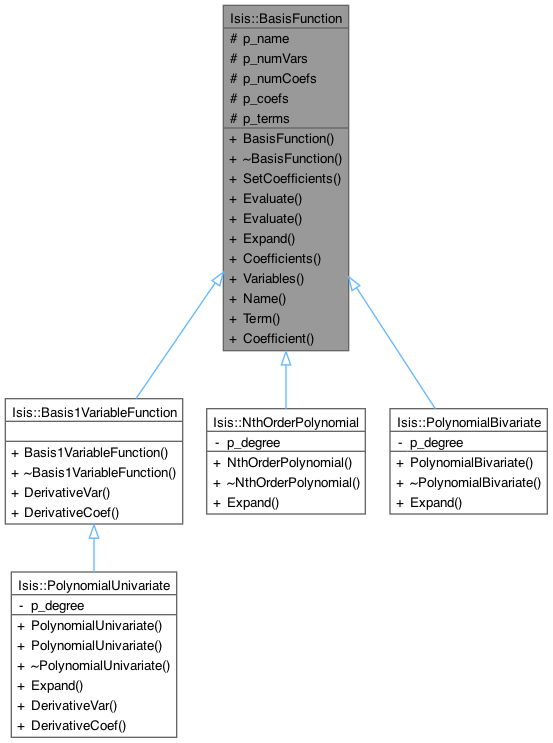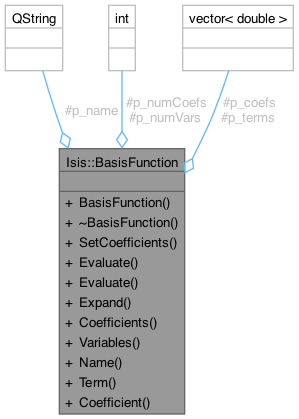 |
Isis 3 Programmer Reference
|
 |
Isis 3 Programmer Reference
|
Generic linear equation class. More...
#include <BasisFunction.h>


Public Member Functions | |
| BasisFunction (const QString &name, int numVars, int numCoefs) | |
| Creates a BasisFunction object. | |
| virtual | ~BasisFunction () |
| Destroys the BasisFunction object. | |
| void | SetCoefficients (const std::vector< double > &coefs) |
| Set the coefficients for the equation. | |
| double | Evaluate (const std::vector< double > &vars) |
| Compute the equation using the input variables. | |
| double | Evaluate (const double &var) |
| Compute the equation using the input variable. | |
| virtual void | Expand (const std::vector< double > &vars) |
| This is the function you should replace depending on your needs. | |
| int | Coefficients () const |
| Returns the number of coefficients for the equation. | |
| int | Variables () const |
| Returns the number of variables in the equation. | |
| QString | Name () const |
| Returns the name of the equation. | |
| double | Term (int c) const |
| Returns the cth term. | |
| double | Coefficient (int i) const |
| Returns the ith coefficient. | |
Protected Attributes | |
| QString | p_name |
| The name of the equation. Call it by using Name() | |
| int | p_numVars |
| The number of variables in the equation. Call it by using Variables() | |
| int | p_numCoefs |
| The number of coefficients in the equation. | |
| std::vector< double > | p_coefs |
| A vector of the coefficients in the equation. | |
| std::vector< double > | p_terms |
| A vector of the terms in the equation. | |
Generic linear equation class.
This is a base class for generating "generic" equations for the Isis least squares fitting algorithm (IsisLSQ). It allows the programmer to set up equations in the form of:
\[ x = C1*T1 + C2*T2 + ... + CN*TN; \]
where C1-CN are coefficients and T1-TN are terms. Note that terms can be comprised of multiple variables and/or functions. For example,
\[ x = C1 + C2*y + C3*y**2; \]
\[ x = C1 + C2*y + C3*z + C4*y*z; \]
By deriving different functions off of this base class this allows the least squares class to be generalized.
2005-03-16 Leah Dahmer - modified file to support Doxygen documentation.
2015-02-20 Jeannie Backer - Improved error messages.
2016-06-10 Marjorie Hahn - Added new signature for Evaluate() that only takes in a single value. Fixes #1679
Definition at line 48 of file BasisFunction.h.
| Isis::BasisFunction::BasisFunction | ( | const QString & | name, |
| int | numVars, | ||
| int | numCoefs ) |
Creates a BasisFunction object.
| name | Name of the BasisFunction. For example, "affine". |
| numVars | Number of variables in the equation. For example: \[ x = C1 + C2*y + C3*z \] has two variables: y and z. |
| numCoefs | Number of coefficients in the equation. For example: \[ x = C1 + C2*y + C3*z \] has three coefficients: C1, C2 & C3. |
Definition at line 29 of file BasisFunction.cpp.
References p_name, p_numCoefs, and p_numVars.
|
inlinevirtual |
Destroys the BasisFunction object.
Definition at line 52 of file BasisFunction.h.
|
inline |
Returns the ith coefficient.
| i | The index for the desired coefficient. |
Definition at line 107 of file BasisFunction.h.
References p_coefs.
Referenced by Isis::PolynomialUnivariate::DerivativeVar(), Isis::SurfaceModel::MinMax(), and Isis::OverlapNormalization::Solve().
|
inline |
Returns the number of coefficients for the equation.
Definition at line 64 of file BasisFunction.h.
References p_numCoefs.
Referenced by Isis::PolynomialUnivariate::DerivativeCoef(), Isis::PolynomialUnivariate::DerivativeVar(), Isis::OverlapNormalization::Solve(), Isis::LeastSquares::SolveQRD(), and Isis::LeastSquares::SolveSVD().
| double Isis::BasisFunction::Evaluate | ( | const double & | var | ) |
Compute the equation using the input variable.
| var | A single double value to use for the equation. |
Definition at line 101 of file BasisFunction.cpp.
References Evaluate().
| double Isis::BasisFunction::Evaluate | ( | const std::vector< double > & | vars | ) |
Compute the equation using the input variables.
| vars | A vector of double values to use for the equation. After setting the coefficients, this can be invoked many times to compute output values given input values. |
Definition at line 64 of file BasisFunction.cpp.
References Expand(), p_coefs, p_numCoefs, p_numVars, p_terms, Isis::IException::Programmer, and Isis::toString().
Referenced by Evaluate(), Isis::LeastSquares::Evaluate(), Isis::LeastSquares::SolveQRD(), and Isis::LeastSquares::SolveSVD().
|
virtual |
This is the function you should replace depending on your needs.
It will expand the variables into the terms of the equation. For example,
\[ x = C1 + C2*y + C3*z + C4*y*z \]
must be expanded into the p_terms vector as (1.0, y, z, y*z). Note that the term expansion is not limited, you can use cos, sin, sqrt, abs, etc. This virtual method is automatically invoked by the Evaluate method. We provide a default expansion of p_terms = vars, just a linear combination of the variables.
| vars | A vector of double values to use for the expansion. |
Reimplemented in Isis::NthOrderPolynomial, Isis::PolynomialBivariate, and Isis::PolynomialUnivariate.
Definition at line 123 of file BasisFunction.cpp.
References p_terms.
Referenced by Evaluate(), Isis::LeastSquares::FillSparseA(), Isis::LeastSquares::SolveQRD(), and Isis::LeastSquares::SolveSVD().
|
inline |
Returns the name of the equation.
Definition at line 80 of file BasisFunction.h.
References p_name.
Referenced by Isis::LeastSquares::AddKnown().
| void Isis::BasisFunction::SetCoefficients | ( | const std::vector< double > & | coefs | ) |
Set the coefficients for the equation.
| coefs | A vector of coefficients for the equation. |
Definition at line 42 of file BasisFunction.cpp.
References p_coefs, p_numCoefs, Isis::IException::Programmer, and Isis::toString().
Referenced by Isis::SpiceRotation::DCJdt(), Isis::PolynomialUnivariate::PolynomialUnivariate(), Isis::LeastSquares::SolveQRD(), Isis::LeastSquares::SolveSparse(), and Isis::LeastSquares::SolveSVD().
|
inline |
Returns the cth term.
This is only valid after a Evalute/Expand has been invoked. It represents the expansion of the variables into the ith term. For example,
\[ x = C1 + C2*x + C3*y + C4*x*y \]
would return x*y for the 3rd term (zero-based)
| c | The index for the desired coefficient. |
Definition at line 97 of file BasisFunction.h.
References p_terms.
Referenced by Isis::LeastSquares::FillSparseA(), Isis::LeastSquares::SolveQRD(), and Isis::LeastSquares::SolveSVD().
|
inline |
Returns the number of variables in the equation.
Definition at line 72 of file BasisFunction.h.
References p_numVars.
Referenced by Isis::LeastSquares::AddKnown(), and Isis::NthOrderPolynomial::Expand().
|
protected |
A vector of the coefficients in the equation.
Call it by using Coefficient()
Definition at line 123 of file BasisFunction.h.
Referenced by Coefficient(), Evaluate(), and SetCoefficients().
|
protected |
The name of the equation. Call it by using Name()
Definition at line 113 of file BasisFunction.h.
Referenced by BasisFunction(), and Name().
|
protected |
The number of coefficients in the equation.
Call it by using Coefficients()
Definition at line 119 of file BasisFunction.h.
Referenced by BasisFunction(), Coefficients(), Evaluate(), and SetCoefficients().
|
protected |
The number of variables in the equation. Call it by using Variables()
Definition at line 115 of file BasisFunction.h.
Referenced by BasisFunction(), Evaluate(), and Variables().
|
protected |
A vector of the terms in the equation.
Call it by using Term()
Definition at line 127 of file BasisFunction.h.
Referenced by Evaluate(), Expand(), Isis::NthOrderPolynomial::Expand(), Isis::PolynomialBivariate::Expand(), Isis::PolynomialUnivariate::Expand(), and Term().